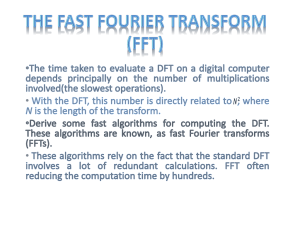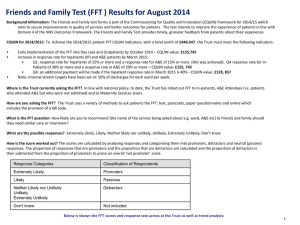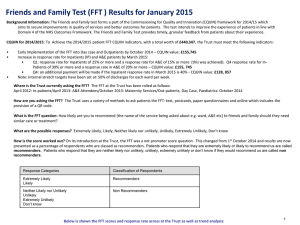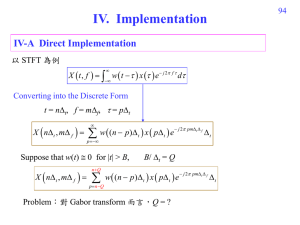Functional Family Therapy - EPISCenter
advertisement
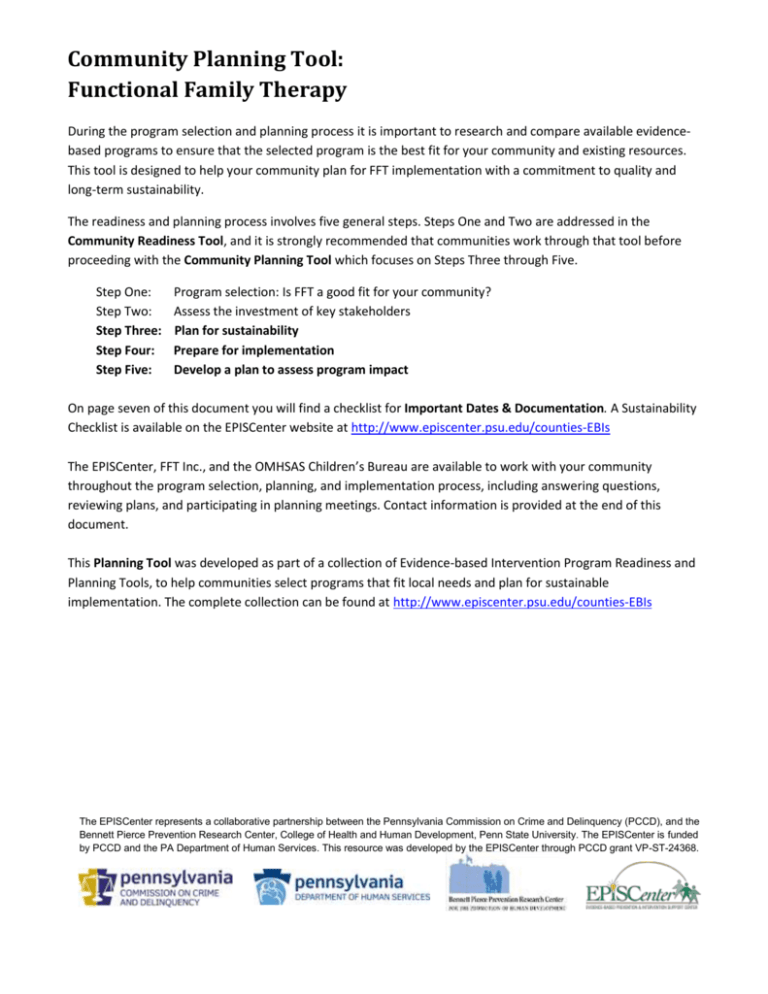
Community Planning Tool: Functional Family Therapy During the program selection and planning process it is important to research and compare available evidencebased programs to ensure that the selected program is the best fit for your community and existing resources. This tool is designed to help your community plan for FFT implementation with a commitment to quality and long-term sustainability. The readiness and planning process involves five general steps. Steps One and Two are addressed in the Community Readiness Tool, and it is strongly recommended that communities work through that tool before proceeding with the Community Planning Tool which focuses on Steps Three through Five. Step One: Step Two: Step Three: Step Four: Step Five: Program selection: Is FFT a good fit for your community? Assess the investment of key stakeholders Plan for sustainability Prepare for implementation Develop a plan to assess program impact On page seven of this document you will find a checklist for Important Dates & Documentation. A Sustainability Checklist is available on the EPISCenter website at http://www.episcenter.psu.edu/counties-EBIs The EPISCenter, FFT Inc., and the OMHSAS Children’s Bureau are available to work with your community throughout the program selection, planning, and implementation process, including answering questions, reviewing plans, and participating in planning meetings. Contact information is provided at the end of this document. This Planning Tool was developed as part of a collection of Evidence-based Intervention Program Readiness and Planning Tools, to help communities select programs that fit local needs and plan for sustainable implementation. The complete collection can be found at http://www.episcenter.psu.edu/counties-EBIs The EPISCenter represents a collaborative partnership between the Pennsylvania Commission on Crime and Delinquency (PCCD), and the Bennett Pierce Prevention Research Center, College of Health and Human Development, Penn State University. The EPISCenter is funded by PCCD and the PA Department of Human Services. This resource was developed by the EPISCenter through PCCD grant VP-ST-24368. Step Three: Plan for Sustainability If there will be an RFP, consider having it reviewed by FFT Inc., the EPISCenter, and DPW for consistency with the FFT model and state policies around FFT. Identify a provider for the service. The provider agency should meet the following criteria: o Agency has strong relationships and good reputation with local stakeholders o Agency leadership is invested in evidence-based programming. o Agency is financially sound and is able to support the ramp-up of services. o Agency is successful with hiring Masters-level clinicians and has good staff retention. o Agency has experience with M.A. funded services and is in good standing with OMHSAS. o Agency is invested in the use of data to demonstrate outcomes, and agrees to utilize FFT’s Client Services System and the INSPIRE system for data reporting. The agency will also need to meet criteria set forth by FFT Inc., such as allowing flexible work schedules, ensuring staff can attend required trainings, and having the necessary resources for implementation. The criteria are outlined in the FFT Site Application, available here: http://www.fftinc.com/implement_new.html The selected provider contacts FFT to express interest in implementing the model. Provider will need to complete and submit an application for site certification to FFT Inc. (See link above.) Vision and mission statements are collaboratively developed by the team, including key stakeholders and provider. This ensures that team members are working with shared expectations and goals. Vision Statement: The vision statement should answer the questions “What do we hope to accomplish by implementing FFT in our community? What is our long-term goal?” It will be used to guide decision-making and select performance measures. Mission Statement: The mission statement is more specific regarding what the FFT program is expected to do and should include the purpose of the program and how, specifically, it will contribute to the group’s vision. 2 For more information, visit www.episcenter.psu.edu or call (814) 863-2568 Community stakeholders develop a plan for encouraging referrals to the program. This differs from the referral process developed with the provider and speaks to how the investment of county leadership will be translated into referrals from line staff, which is a common barrier to program success. The plan may include strategies such as: Require all line staff to attend quarterly or semiannual presentations about FFT Require provider agency to regularly share outcomes data with referral sources Establish a process for regular check-ins by supervisors to ensure referrals are being made to the program Identify a county-level coordinator who can be responsible for identifying cases appropriate for referral to FFT Establish weekly meetings where county cases are discussed and assigned to the most appropriate service Ineffective strategies include one-time education about the new service – this is generally not sufficient to change referral patterns. Our plan: The impact of the plan on referrals should be monitored and adjusted as necessary, once implementation begins. 3 Develop a plan for ensuring the majority of referred youth can begin services immediately. One of the recommended options should be chosen and agreed upon by the stakeholder team: o Option 1: BH-MCO will provide an initial authorization (4-6 weeks) based on a pre-assessment completed by the program and require the full M.A. packet be submitted before the authorization period is extended. o Option 2: County funds will be used to pay for services until the youth is authorized by M.A. For more information, visit www.episcenter.psu.edu or call (814) 863-2568 Provider develops a budget and, partnering with the BH-MCO and county leaders, identifies funding for each aspect of the budget. The Collaborative Funding Plan, available on the EPISCenter website at http://www.episcenter.psu.edu/counties-EBIs , is recommended as a guide. o A list of common FFT program expenses can be found in the FAQ at: http://www.episcenter.psu.edu/ebp/familytherapy o It is understood that over time the fees to FFT Inc. may fluctuate. For instance, if the site reaches Phase 3 but then loses its FFT supervisor, the site must pay FFT Inc. an increased fee to provide clinical oversight until a new supervisor is trained. These costs should be accounted for in the budget. o Budget should allow for a profit margin to buffer provider against unexpected expenses and financial challenges. o Budget takes into consideration that in Pennsylvania FFT providers are expected to hire Masterslevel therapists, and allows for sufficient support staff so that therapists can focus on clinical service delivery. Review the 2011 letter clarifying how county funds may be used for EBPs: http://www.episcenter.psu.edu/sites/default/files/Special%20Grants%20Letter%20Jan%202011.pdf o Submit a request for county funding as part of Needs Based Budget & Plan A schedule is established for regular planning and implementation meetings involving the provider and key stakeholders. Step Four: Prepare for Implementation 4 Provider will: o Submit service description to OMHSAS Children’s Bureau for review and approval. An FFT service description template is available from the Children’s Bureau upon request. Note that FFT is a BHRS program exception service and as such falls under Medical Assistance Bulletin 1153-95-01, a copy of which can be found at: http://services.dpw.state.pa.us/olddpw/bulletinsearch.aspx?BulletinId=2019 o Enroll in PROMISe as a Provider Type 340 o Complete BH-MCO process for becoming an enrolled FFT provider. o Establish Service Agreements with other agencies and providers, to facilitate smooth referrals of youth when necessary. For more information, visit www.episcenter.psu.edu or call (814) 863-2568 o o o o o 5 Provider reviews OMHSAS expectations regarding compliance with M.A. requirements and documentation. These include but are not limited to: OMHSAS Site Audit Tool (available upon request from OMHSAS Children’s Bureau) See #15 in the FAQ about MA Enrollment, Billing, & Monitoring, available at http://www.episcenter.psu.edu/resources/DPW Sample treatment plan and treatment plan template, available at http://www.episcenter.psu.edu/ebp/familytherapy Sample ISPT invitation and feedback form available, at http://www.episcenter.psu.edu/resources/DPW A managed care rate is set. o The rate is based on model-consistent productivity requirements. For instance, the model recommends a full-time FFT therapist carry 10-12 cases and should see each case once a week or more, depending on each family’s risk factors. In FFT a significant amount of time is dedicated to supervision and case planning outside of sessions, so the session itself is used effectively. o The budget allows for administrative support to handle case management responsibilities such as helping youth become M.A. eligible, obtaining authorizations for care, scheduling evaluations and Interagency Service Planning Team (ISPT) meetings, and so forth. It is not only more cost-effective to identify support staff to assist with these tasks, but it also allows clinical staff to focus their time and energy on providing care to clients and their families. See Administrative Duties in EBIs for more detail. o Billable activities are clearly agreed upon and put in writing. See the Collaborative Funding Plan for guidance. o A county-provider contract is established, outlining the amount of funding available, how county funds will be used for FFT (i.e., allowable costs), which youth are eligible, how funds can be accessed, and billing/payment structure. The 2011 letter clarifying how county funds may be used for evidence-based programming should be used for guidance: http://www.episcenter.psu.edu/sites/default/files/Special%20Grants%20Letter%20Jan%202011.pdf o One or both of the following occur. These steps will reduce the amount of time that the county is responsible for paying for services, by County leadership engages County Assistance Office regarding a process to expedite M.A. eligibility packets for youth referred to FFT. Provider and BH-MCO work together to establish a protocol for accessing retro-eligibility. This allows providers to bill M.A. for services from the date the M.A. packet is submitted to the CAO, rather than waiting until the date it is approved. Provider recruits, interviews, and hires therapists, support staff, and other critical program personnel. Resources: o Sample Interview Questions from FFT Inc. http://www.fftinc.com/resources/FFT_Interview_Questions_with_Answer_detailpdf.pdf o Sample Therapist Job Description from FFT Inc. http://www.fftinc.com/resources/FFT_Therapist_Job_Descriptionpdf.pdf For more information, visit www.episcenter.psu.edu or call (814) 863-2568 o Hiring Checklist for Pennsylvania Programs http://www.episcenter.psu.edu/sites/default/files/ebp/FFT%20Hiring%20Checklist%20FINAL%2082011.pdf Provider participates in a one-day implementation meeting. County initiates plan for facilitating referrals to the program. Referrals should be ready for therapists to begin seeing families as soon as the initial clinical training is completed. Therapists attend the initial 2-day clinical training. Appropriate program staff receives INSPIRE training from EPISCenter. (See Step 5 on page 7 for more information.) Step Five: Develop a Plan to Assess Program Impact 6 County stakeholders and BH-MCO review the INSPIRE Data Highlights Report (available at http://www.episcenter.psu.edu/EBIReports) and determine what additional performance measures, if any, they would like reported by the provider. These measures should be directly related to the program vision established by the team. Additional Data Requested: Note: Stakeholders are strongly encouraged to use the INSPIRE report and keep additional data requests to a minimum. INSPIRE facilitates reliable and standardized outcome reporting by FFT providers across the state. Additional reporting requirements increase the administrative burden and associated expense for providers. Frequency and format of reporting to local stakeholders is determined: FFT Administrator from provider agency reviews the INSPIRE FAQ and the INSPIRE Quarterly Reporting Protocol. Available at: http://www.episcenter.psu.edu/node/181 Provider receives CSS Training as part of the one-day orientation before the program begins accepting clients. Provider contacts the EPISCenter to initiate participation in INSPIRE. For more information, visit www.episcenter.psu.edu or call (814) 863-2568 Provider returns necessary forms to EPISCenter: 1) authorization to download access of CSS data, and 2) data sharing agreement. Provider identifies who will responsible for data entry and submitting quarterly reports, and submits this information to EPISCenter to have user accounts created. Provider reviews INSPIRE materials on-line and downloads copies of the User Screen Guides, available at: http://www.episcenter.psu.edu/node/181 INSPIRE users participate in INSPIRE training. Important Dates & Documentation Important Planning Dates The earliest that BH-MCO funding for FFT will be available: _____/_____/_____ The earliest that county funding for FFT will be available: _____/_____/_____ Date for FFT Implementation Training (1 day): _____/_____/_____ Dates for Initial FFT Clinical Training (2 days): _____/_____/_____ & _____/_____/_____ Documentation 7 Service description approval from OMHSAS Provider Service Agreement with other programs Provider contract with FFT Inc. Provider budget Collaborative funding plan County-provider contract For more information, visit www.episcenter.psu.edu or call (814) 863-2568 Who to Contact For More Information EPISCenter Liz Campbell, Ph.D. Intervention Programs Coordinator (717) 233-1350 ecampbell@episcenter.org OMHSAS Children’s Bureau Ebonnie Simmons-Hall, MSW Program Representative (717) 772-6870 esimmonsha@pa.gov FFT Inc. Helen Midouhas FFT Site Certification Specialist & National Trainer (610) 533-0026 helenm2@verizon.net 8 For more information, visit www.episcenter.psu.edu or call (814) 863-2568
